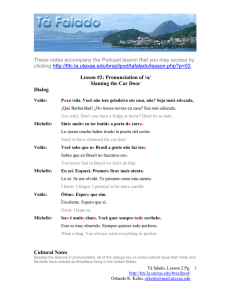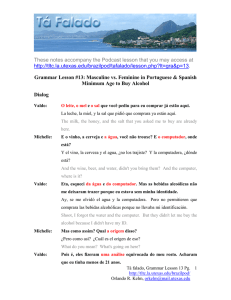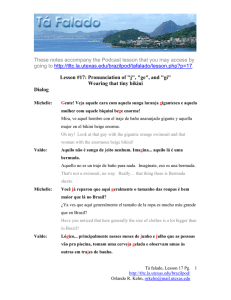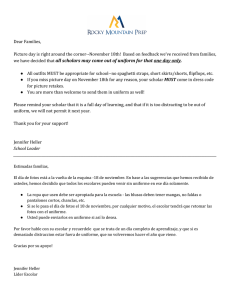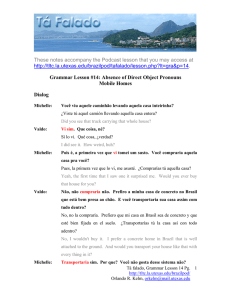T falado
Anuncio
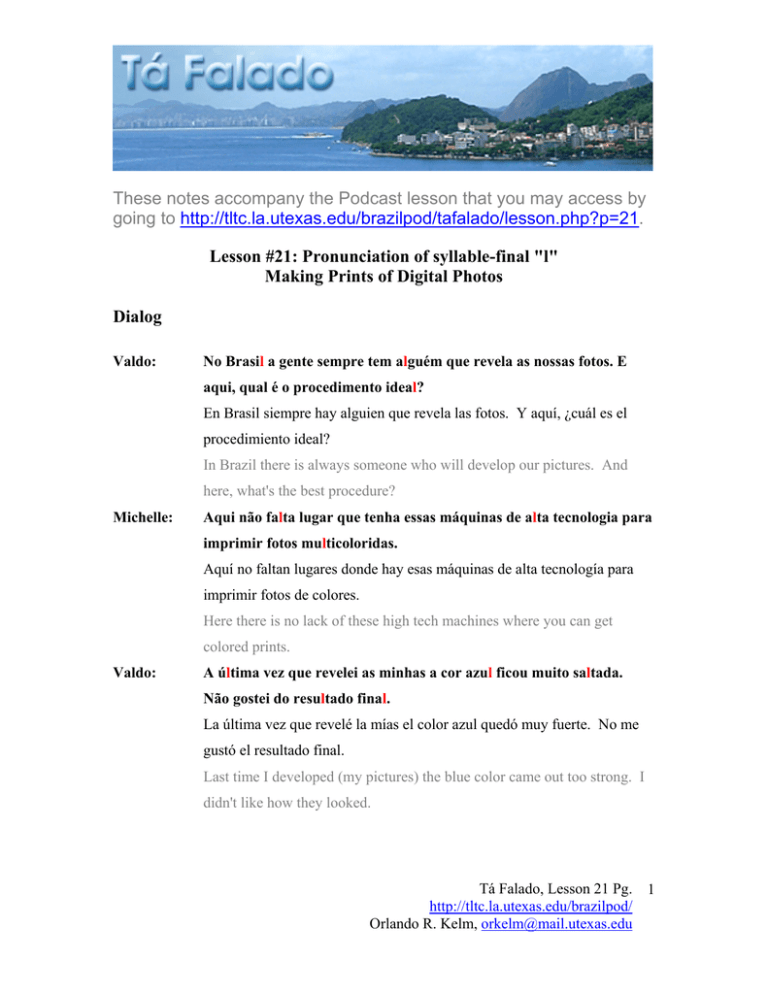
These notes accompany the Podcast lesson that you may access by going to http://tltc.la.utexas.edu/brazilpod/tafalado/lesson.php?p=21. Lesson #21: Pronunciation of syllable-final "l" Making Prints of Digital Photos Dialog Valdo: No Brasil a gente sempre tem alguém que revela as nossas fotos. E aqui, qual é o procedimento ideal? En Brasil siempre hay alguien que revela las fotos. Y aquí, ¿cuál es el procedimiento ideal? In Brazil there is always someone who will develop our pictures. And here, what's the best procedure? Michelle: Aqui não falta lugar que tenha essas máquinas de alta tecnologia para imprimir fotos multicoloridas. Aquí no faltan lugares donde hay esas máquinas de alta tecnología para imprimir fotos de colores. Here there is no lack of these high tech machines where you can get colored prints. Valdo: A última vez que revelei as minhas a cor azul ficou muito saltada. Não gostei do resultado final. La última vez que revelé la mías el color azul quedó muy fuerte. No me gustó el resultado final. Last time I developed (my pictures) the blue color came out too strong. I didn't like how they looked. Tá Falado, Lesson 21 Pg. 1 http://tltc.la.utexas.edu/brazilpod/ Orlando R. Kelm, orkelm@mail.utexas.edu Michelle: Eh, aqui quem revela as fotos somos nós mesmos. É só salvar num CD ou levar o cartão de memória da máquina, selecionar no painel as fotos que você quer e imprimir no papel. Sí, aquí revelamos las fotos nosotros mismos. Es solo grabar en un CD o llevar la memoria de la cámara, seleccionar en la pantalla las fotos que desea y luego imprimir en el papel. Here you can develop your own pictures. You just have to save them to a CD or take the memory card, select the prints you want on the screen and print them out on paper. Valdo: Nada mal, hein? Culturas diferentes, né? Mas é fácil usar essas máquinas? É igual a um caixa eletrônico? Está bien, ¿verdad? Culturas diferentes, ¿no? ¿Es fácil usar esas máquinas? ¿Es igual a un cajero automático? Not bad, right? Different cultures I guess. But is it easy to use these machines? Is it like an ATM machine? Michelle: É super fácil. Você pode revelar mais de mil fotos e o custo não é alto. Es súper fácil. Se puede revelar más de mil fotos y el costo no es alto. It's really easy. You could print out a thousand pictures and it doesn't cost a lot. Cultural Notes Besides the lessons in pronunciation, all of the dialogs key on some cultural issue that Valdo and Michelle have noticed as Brazilians living in the United States. Valdo and Michelle have both been impressed with the self-service photo machines. All you have to do is bring in your memory card or your pictures on a CD, drop them in the machine and order prints for you pictures. It is just one more example of things that Brazilians hire someone to do, but is more self-service in the U.S. Tá Falado, Lesson 21 Pg. 2 http://tltc.la.utexas.edu/brazilpod/ Orlando R. Kelm, orkelm@mail.utexas.edu Pronunciation Notes Let's start with a mini-lesson about the "l" sounds in Spanish and English. English has two basic sounds for "l" depending on whether it is at the beginning or the end of the syllable. Compare, for example, the difference in the sound of "l" in the words "lamb" and "mall". The "l" in "mall" is "velarized", also called the "dark l". It is pronounced farther back in the mouth. Spanish has no velarized "l", so the "l" in "lama" sounds just the same as the "l" in "mal". As a final comparison, notice how different the English "mall" and the Spanish "mal" sound. In Portuguese the situation is more similar to that of English. That is to say, when "l" is at the beginning of the syllable, it sounds just like Spanish and English. But, when "l" is at the end of the syllable, it actually sounds more like a "w". So when you see "Brazil, fatal, local, ideal, sol" think "Brasiw, fataw, locaw, ideaw, and sow" and you'll actually sound better. This tendency is so strong in Portuguese that even if the next word begins with a vowel, the "l" maintains its syllable final pronunciation. For example, "Brasil e Portugal" is pronounced "bra.ziw.i.por.tu.gaw". This also means that the word "alto" and "auto" and "mau" and "mal" are actually pronounced the same. Tá Falado, Lesson 21 Pg. 3 http://tltc.la.utexas.edu/brazilpod/ Orlando R. Kelm, orkelm@mail.utexas.edu
